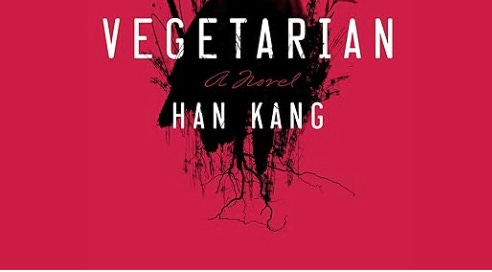BookLife Review by Carol O’Day: The Vegetarian (Han Kang, author)
2024 Pulitzer Prize for Literature, Booker International Prize, Korean characters, body autonomy, vegetarianism, child abuse, rape, mental illness, sisters, power of dreams, video artist, nudity
Han Kang’s short and shocking novel, The Vegetarian, was awarded the Booker International Prize, and Kang received the 2024 Pulitzer Prize for Literature. The Vegetarian is a no-holds barred, head-first dive into the intersection of personal autonomy, bodily integrity, trauma and madness. Yeong-hye is a plain, quiet woman. She is married to Mr. Cheong, a man who lacks ambition or charisma. Mr. Cheong is, in fact, pleased that his wife is “almost not attractive to him”, describing her as “completely unremarkable in every way….Middling height, bobbed hair neither long nor short; jaundiced, sickly-looking skin, somewhat prominent cheekbones; her timid sallow aspect told me all I needed to know.” Their daily life is dull and their marriage loveless. Yeong-hye works part-time from home. Mr. Cheong works very long hours at his desk job in Seoul. When Yeong-hye begins having lurid, violent, bloody nightmares, she begins sleeping and engaging less and less. The specifics and origins of her dream are never made fully clear, but clues emerge–we learn that throughout her childhood, her father beat her daily by striking her across her calves.
One day after again having the disturbing, recurring dream, Yeong-hye purges their refrigerator of all meat and animal products. She announces that she will no longer eat meat. She begins to lose weight, sleeps less, speaks very little, wears no bra, and sheds her clothes when she is in her home. At a family reunion, Yeong-hye’s father attempts to force Yeong-hye to eat. She refuses. Her father strikes her twice across her face and attempts to force meat into her mouth. She rages and cuts her wrist in protest. Her sister’s husband rushes her to the emergency room and Yeong-hye is admitted to a hospital for mental health care. After a period of years, during which her husband files for divorce, Yeong-hye is released. She resides for a while in her sister and brother-in-law’s home.
Part way through the short novel, Kang pivots and continues the story from the perspective of Yeong-hye’s brother-in-law, previously described only as an artist who did not hold a regular job. The artist is deep into developing a new work of video art. His vision is to paint flowers all over the bodies of a naked woman and a naked man. He plans to film the painting and then film the two bodies engaged in sex on camera. His inspiration for the piece is Yeong-hye. The artist has fantasized about his plain sister-in-law since her attempted suicide. After her release from the hospital, Yeong-hye’s vegetarianism and disinterest in food intensified. She became reclusive and asocial. Nonetheless, the artist brother-in-law persuades her to model for him. She placidly submits to the body-painting and seems to enjoy being painted with flowers. The artist enlists a male colleague to submit to the floral body painting as her counterpart. When the male colleague balks at participating in a sexual interaction between the painted bodies on camera, even for the sake of art, the artist has himself painted. He visits his sister-in-law’s residence and the two of them complete the video. His wife, In-hye, finds the artist in her sister’s apartment, both naked, bodies painted in flowers, and asleep . When they awaken, In-hye is struck by her sister’s mental deterioration, and summons the authorities to take her husband and sister to hospital for evaluation.
The final third of the book is told from the perspective of In-hye, as she navigates Yeong-hye’s sister’s progressive deterioration at the hospital where she has been institutionalized for anorexia nervosa and harmful delusions. Yeong-hye believes she is becoming a tree. She consumes little but water, and rejects staff’s attempts to force feed her. She begins standing on her head at length, believing her hands are roots and her legs and feet are branches. On one outing on the hospital grounds, Yeong -hye goes missing for hours. She is found standing naked and catatonic among the trees in the woods. The depth of her sister’s delusions releases waves of grief and memory in In-hye. She recalls her own depression and the shame of her own suicidal ideation. She empathizes with her sister, and resigns herself to accept Yeong-hye’s autonomy over her own body.
Kang’s stunning, short novel is ground-breaking. Yeong-hye’s exercise of autonomy is seen as histrionic. Her choice to become a vegetarian is at first viewed as whimsical and temporary. Her adherence to her decision, or perhaps the consequences of the extreme extent of her commitment to the idea, is categorized as mental illness. Yet, is it any wonder that Yeong-hye has an existential need to assert autonomy over her own body? She was repeatedly physically abused as a child by her own father. She enters into a loveless marriage in which her husband occasionally forces himself on her sexually. Where (or why) does a woman’s exercise of autonomy, of choice, over her body and its functions become mental illness, and who determines that distinction? Is it the decision to forego meat? The choice to not wear a brassiere? The preference to be naked in one’s own home? The desire to stand in a handstand for hours at a time? Is madness what exists where autonomy meets self-harm, or is that also a choice? This incisive, shocking novel asks all of these questions, and more.
Please support BookLife: Reviews for Readers and independent book sellers by purchasing The Vegetarian using the Bookshop.org link below.





